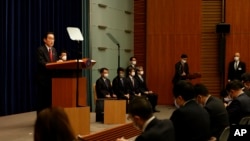ຍີປຸ່ນ ປະກາດໃນວັນອັງຄານວານນີ້ ກ່ຽວກັບການລົງໂທດຮອບໃໝ່ ຕໍ່ຣັດເຊຍ ນັບແຕ່ປະເທດດັ່ງກ່າວບຸກເຂົ້າໄປໃນຢູເຄຣນ ຊຶ່ງເປັນສັນຍານສະແດງໃຫ້ເຫັນເຖິງການປ່ຽນແປງຈາກການຮັບມືແບບນຸ້ມນວນໄປສູ່ການຕອບໂຕ້ທີ່ເປັນປິດສະໜາຫຼາຍຂຶ້ນ ຕໍ່ການເຂົ້າຢຶດຄອງແຫຼມໄຄຣເມຍຂອງມົສກູ ໃນປີ 2014.
ການລົງໂທດຮອບຫຼ້າສຸດນີ້ ແມ່ນຮວມທັງຄວບຄຸມການເຄື່ອນຍ້າຍແລະຊັບສິນຂອງຫຼາຍສ່ວນບຸກຄົນທີ່ພົວພັນກັບປະທານາທິບໍດີຣັດເຊຍ ທ່ານວລາດີເມຍ ປູຕິນ ພ້ອມທັງເຈົ້າໜ້າທີ່ເບລາຣຸສຈຳນວນນຶ່ງ. ນອກນັ້ນຍັງຮວມທັງການຫ້າມໃນການສົ່ງອອກອຸບປະກອນກັ່ນນ້ຳມັນໄປຣັດເຊຍ ແລະການສົ່ງອອກອຸບປະກອນຈຳນວນນຶ່ງໄປເບລາຣຸສ ທີ່ສາມາດນຳໃຊ້ໃນທາງທະຫານໄດ້ ອີງຕາມລາຍງານອົງການຂ່າວຣອຍເຕີ້.
ເປົ້າໝາຍຂອງການລົງໂທດແມ່ນຮວມທັງຮອງຫົວໜ້າທີ່ປຶກສາຂອງລັດຖະບານປູຕິນ ຜູ້ນຳຂອງສາທາລະນະລັດເຊັສເນຍ ແລະພວກຫົວໜ້າຂອງບໍລິສັດຕ່າງໆທີ່ມີຄວາມສຳພັນໃກ້ຊິດກັບວັງເຄຣັມລິນ ເຊັ່ນກຸ່ມວອລກາ ແທຣນສ໌ແນຟ ແລະກຸ່ມແວັກເນີ ອີງຕາມການປະກາດ ຂອງກະຊວງການເງິນຍີ່ປຸ່ນ ໃນວັນອັງຄານວານນີ້.
ຂໍ້ຈຳກັດຕ່າງໆເຫຼົ່ານີ້ແມ່ນເພີ້ມໃສ່ການລົງໂທດທີ່ປະກາດໄປແລ້ວໃນທ້າຍເດືອນກຸມພາຜ່ານມາ ເວລາໂຕກຽວໄດ້ຫ້າມບໍ່ໃຫ້ຊາວຣັດເຊຍຈຳນວນນຶ່ງເຂົ້າປະເທດແລະອີກຈຳນວນນຶ່ງຖືກກັກຊັບສິນ ຮວມທັງຊັບສິນທີ່ເຊື່ອວ່າ ເປັນຂອງປູຕິນນຳດ້ວຍ.
ນອກນັ້ນ ຍີ່ປຸ່ນຍັງໄດ້ຈັດຕັ້ງປະຕິບັດ ການຄວບຄຸມໃນການສົ່ງອອກຮາຍເທັກແລະເຂົ້າຮ່ວມກັບກຸ່ມ 7 ປະເທດທີ່ຈະເລີນທາງດ້ານອຸດສາຫະກຳ ຫລືກຸ່ມຈີ 7 ເພື່ອປະຕິເສດບໍ່ໃຫ້ຣັດເຊຍ ເຂົ້າເຖິງລະບົບຈ່າຍເງິນລະຫວ່າງທະນາຄານຕໍ່ທະນາຄານຂອງໂລກທີ່ເອີ້ນວ່າ SWIFT ນັ້ນ. ກຸ່ມຈີ 7 ແມ່ນປະກອບດ້ວຍອັງກິດ ການາດາ ຝຣັ່ງ ເຢຍຣະມັນ ອີຕາລີ ຍີ່ປຸ່ນ ແລະສະຫະລັດ ບວກໃສ່ກັບສະຫະພາບຢູໂຣບ.
ການເອົາບາດກ້າວເຫຼົ່ານີ້ ແມ່ນຂັດກັບການໃຫ້ຄວາມເຫັນ ຂອງນາຍົກລັດຖະມົນຕີຍີປຸ່ນ ທ່ານຟູມິໂອະ ກິຊິດະ ໃນຕົ້ນປີນີ້. ໃນຄຳປາໄສກ່ຽວກັບນະໂຍບາຍ ເມື່ອວັນທີ 17 ມັງກອນຜ່ານມາ ທ່ານກິຊິດະກ່າວວ່າ ໂຕກຽວພ້ອມແລ້ວ ທີ່ຈະພັດທະນາ “ຄວາມສຳພັນແບບກວມລວມຮອບດ້ານກັບຣັດເຊຍ ຮວມທັງການຮ່ວມມືໃນພາກສ່ວນພະລັງງານ.”
ໃນວັນທີ 25 ກຸມພາຜ່ານມາ ເວລາຍີ່ປຸ່ນປະກາດກ່ຽວກັບມາດຕະການລົງໂທດ ນັ້ນ ທ່ານກິຊິດະ ໄດ້ນຳໃຊ້ນ້ຳສຽງທີ່ຕ່າງອອກໄປໂດຍທວງໃຫ້ຣັດເຊຍຢຸດເຊົາການຮຸກຮານແລະຖອນກຳລັງອອກໄປ. ທ່ານກ່າວວ່າ “ການໂຈມຕີນີ້ໄດ້ເຮັດໃຫ້ພື້ນຖານຄວາມເປັນລະບຽບຂອງລະຫວ່າງປະເທດສັ່ນສະເທືອນ.”
Japan announced Tuesday a new round of sanctions on Russia since its invasion of Ukraine, signaling a shift from its gentler and more ambiguous response to Moscow’s seizure of Crimea in 2014.
The latest sanctions include controls on the movement and assets of several individuals associated with Russian President Vladimir Putin, as well as some additional Belarusian officials. They also include an export ban on Russia-bound oil refinery equipment and Belarus-bound general-purpose items that its military could use, according to Reuters. (( https://www.reuters.com/world/asia-pacific/japan-freezes-assets-32-more-russian-belarusian-officials-oligarchs-2022-03-08/ ))
Targets of the sanctions include Putin administration deputy chiefs of staff, the head of the Chechen Republic, and executives of Kremlin-linked companies such as Volga Group, Transneft and Wagner Group, Japan's Finance Ministry said Tuesday.
These restrictions are in addition to those imposed in late February, when Tokyo barred entry of select Russians and froze the assets of others, including some assets believed to belong to Putin.
Japan has also implemented high-tech export controls and joined the Group of Seven nations, or G-7, in denying some Russian banks access to the global bank-to-bank payment system, SWIFT. The G-7 includes Britain, Canada, France, Germany, Italy, Japan and the United States, plus the European Union.
Such actions stand in contrast to remarks made by Japanese Prime Minister Fumio Kishida earlier this year. In a January 17 policy speech, Kishida said Tokyo was ready to develop a "comprehensive relationship with Russia, including cooperation in the energy sector." [[ https://www.aninews.in/news/world/asia/japan-to-develop-comprehensive-relations-with-russia-including-on-energy-japanese-pm20220117130135/ ]]
On February 25, when Japan announced a package of sanctions, Kishida adopted a different tone, demanding that Russia stop the invasion and withdraw. The "attack shakes the foundation of the international world order," he said. [[ https://english.kyodonews.net/news/2022/02/9cf5c8f99a31-japan-to-consider-natl-interest-in-shaping-ukraine-response-kishida.html ]]
The last time Japan was called on to impose sanctions on Russia was in 2014, when Russia annexed Crimea in southern Ukraine. At the time, Tokyo's response was ambiguous, with then-Prime Minister Shinzo Abe wanting to persuade Putin to return four islands off Hokkaido in northern Japan that the Soviet Union had claimed at the end of World War II. The two nations have never signed a peace treaty following the war.
[[ https://theowp.org/increasing-tensions-in-russia-japan-kuril-islands-dispute/ ]]
Bunji Abe, a professor emeritus at Osaka Kyoiku University in Japan, [[ https://researchmap.jp/read0138256 ]] said that in 2014, most Japanese were waiting to see whether the two sides could reach a peace treaty.
"Today, however, a majority of Japanese have given up that hope, thinking Russia has no intention of returning any of the Northern Territories," he told VOA Mandarin.




